Essay: Social Identity Formation Through Single Stories and Tongues
VerifiedAdded on 2021/12/12
|5
|1221
|89
Essay
AI Summary
This essay explores the formation of social identity, focusing on the influence of single stories and language, as examined in Chimamanda Ngozi Adichie's "The Danger of a Single Story" and Zadie Smith's "Speaking in Tongues." The essay argues that societal biases and stereotypes, often perpetuated through limited perspectives and linguistic differences, significantly shape how individuals are perceived and how they perceive themselves. The author provides personal experiences and connects with the ideas presented by Adichie and Smith, highlighting the challenges faced by international students and the impact of accents on social acceptance. The essay emphasizes the need to challenge dominant narratives, embrace multiple perspectives, and foster a deeper understanding of diverse cultures to combat racism and discrimination. The conclusion advocates for critical thinking and a conscious effort to overcome biases in order to achieve a more inclusive and harmonious society.
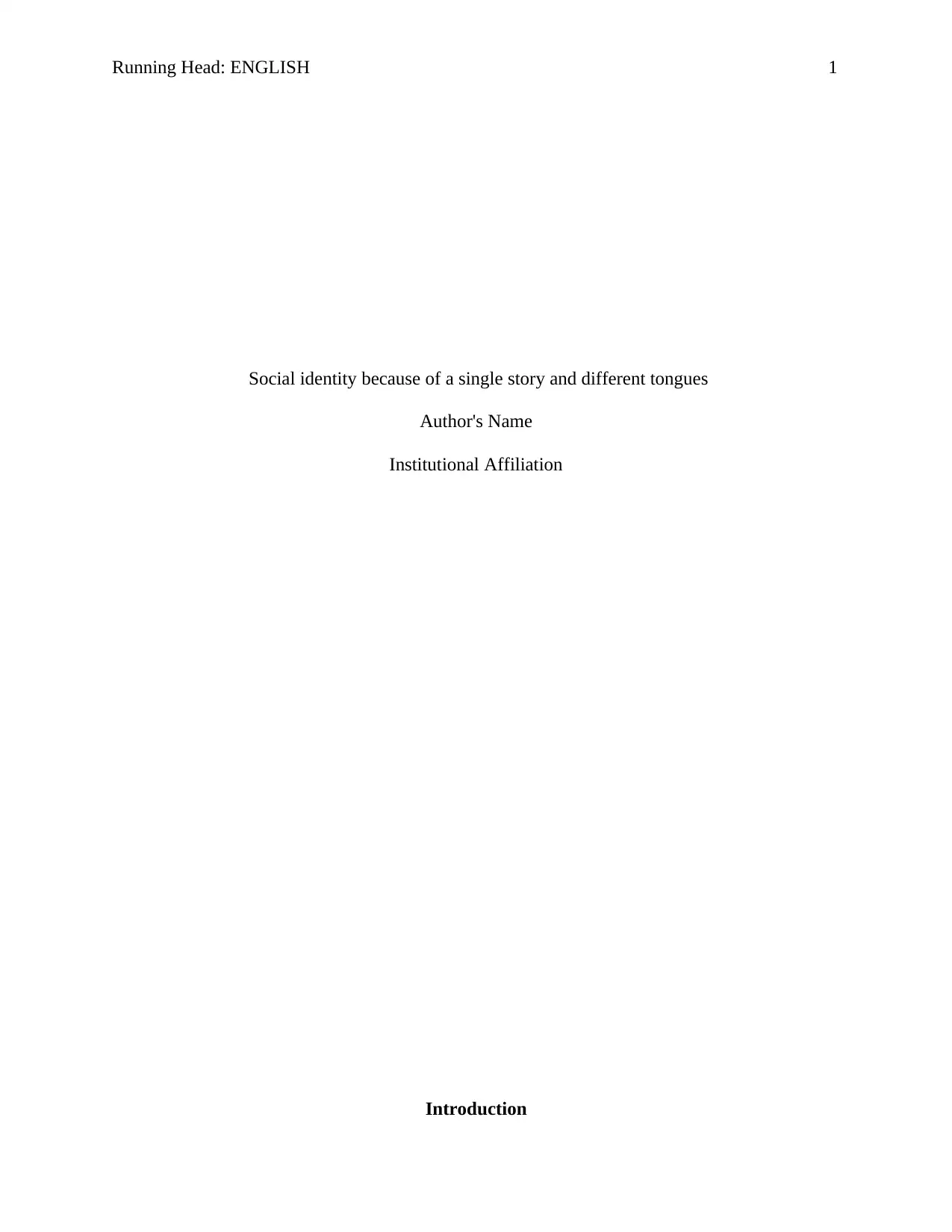
Running Head: ENGLISH 1
Social identity because of a single story and different tongues
Author's Name
Institutional Affiliation
Introduction
Social identity because of a single story and different tongues
Author's Name
Institutional Affiliation
Introduction
Paraphrase This Document
Need a fresh take? Get an instant paraphrase of this document with our AI Paraphraser
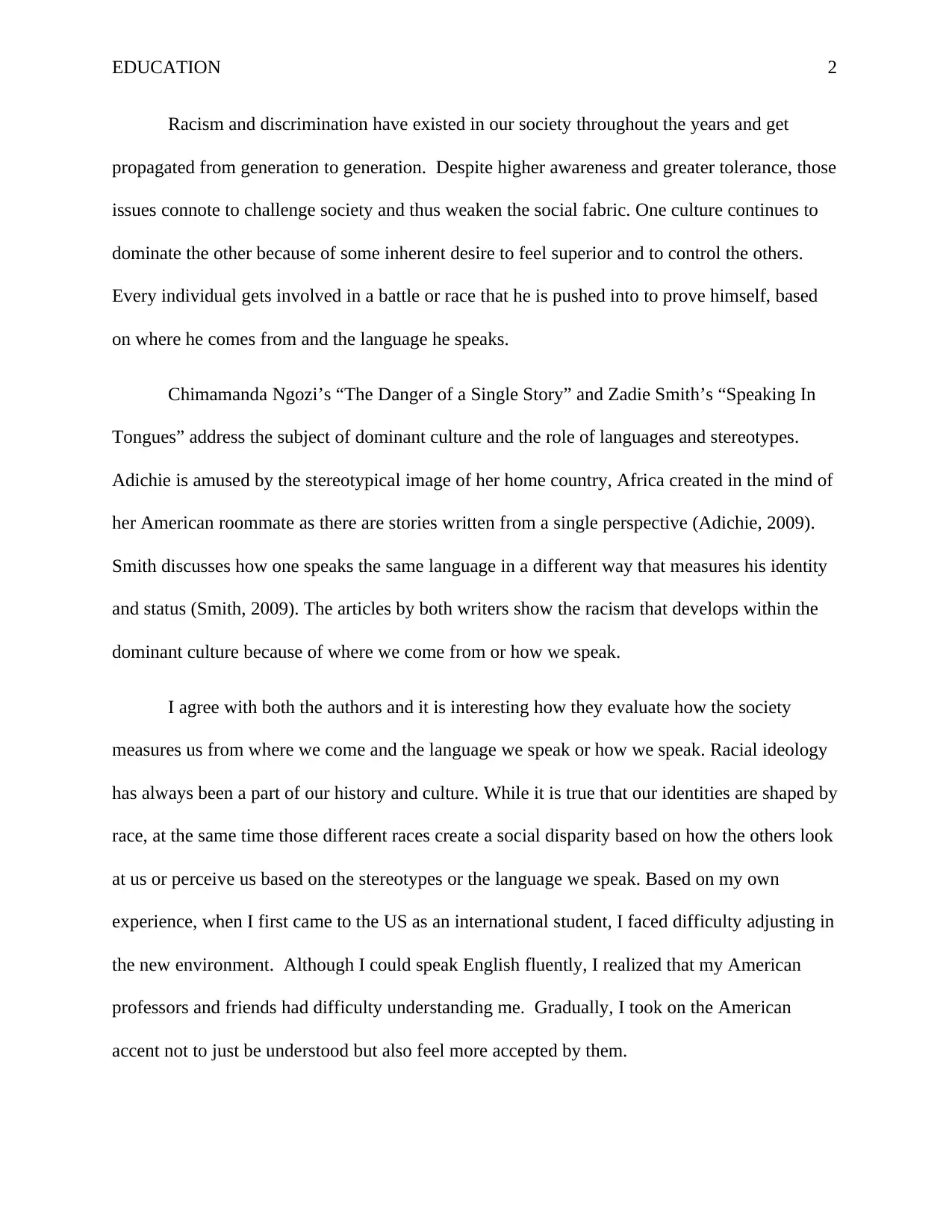
EDUCATION 2
Racism and discrimination have existed in our society throughout the years and get
propagated from generation to generation. Despite higher awareness and greater tolerance, those
issues connote to challenge society and thus weaken the social fabric. One culture continues to
dominate the other because of some inherent desire to feel superior and to control the others.
Every individual gets involved in a battle or race that he is pushed into to prove himself, based
on where he comes from and the language he speaks.
Chimamanda Ngozi’s “The Danger of a Single Story” and Zadie Smith’s “Speaking In
Tongues” address the subject of dominant culture and the role of languages and stereotypes.
Adichie is amused by the stereotypical image of her home country, Africa created in the mind of
her American roommate as there are stories written from a single perspective (Adichie, 2009).
Smith discusses how one speaks the same language in a different way that measures his identity
and status (Smith, 2009). The articles by both writers show the racism that develops within the
dominant culture because of where we come from or how we speak.
I agree with both the authors and it is interesting how they evaluate how the society
measures us from where we come and the language we speak or how we speak. Racial ideology
has always been a part of our history and culture. While it is true that our identities are shaped by
race, at the same time those different races create a social disparity based on how the others look
at us or perceive us based on the stereotypes or the language we speak. Based on my own
experience, when I first came to the US as an international student, I faced difficulty adjusting in
the new environment. Although I could speak English fluently, I realized that my American
professors and friends had difficulty understanding me. Gradually, I took on the American
accent not to just be understood but also feel more accepted by them.
Racism and discrimination have existed in our society throughout the years and get
propagated from generation to generation. Despite higher awareness and greater tolerance, those
issues connote to challenge society and thus weaken the social fabric. One culture continues to
dominate the other because of some inherent desire to feel superior and to control the others.
Every individual gets involved in a battle or race that he is pushed into to prove himself, based
on where he comes from and the language he speaks.
Chimamanda Ngozi’s “The Danger of a Single Story” and Zadie Smith’s “Speaking In
Tongues” address the subject of dominant culture and the role of languages and stereotypes.
Adichie is amused by the stereotypical image of her home country, Africa created in the mind of
her American roommate as there are stories written from a single perspective (Adichie, 2009).
Smith discusses how one speaks the same language in a different way that measures his identity
and status (Smith, 2009). The articles by both writers show the racism that develops within the
dominant culture because of where we come from or how we speak.
I agree with both the authors and it is interesting how they evaluate how the society
measures us from where we come and the language we speak or how we speak. Racial ideology
has always been a part of our history and culture. While it is true that our identities are shaped by
race, at the same time those different races create a social disparity based on how the others look
at us or perceive us based on the stereotypes or the language we speak. Based on my own
experience, when I first came to the US as an international student, I faced difficulty adjusting in
the new environment. Although I could speak English fluently, I realized that my American
professors and friends had difficulty understanding me. Gradually, I took on the American
accent not to just be understood but also feel more accepted by them.
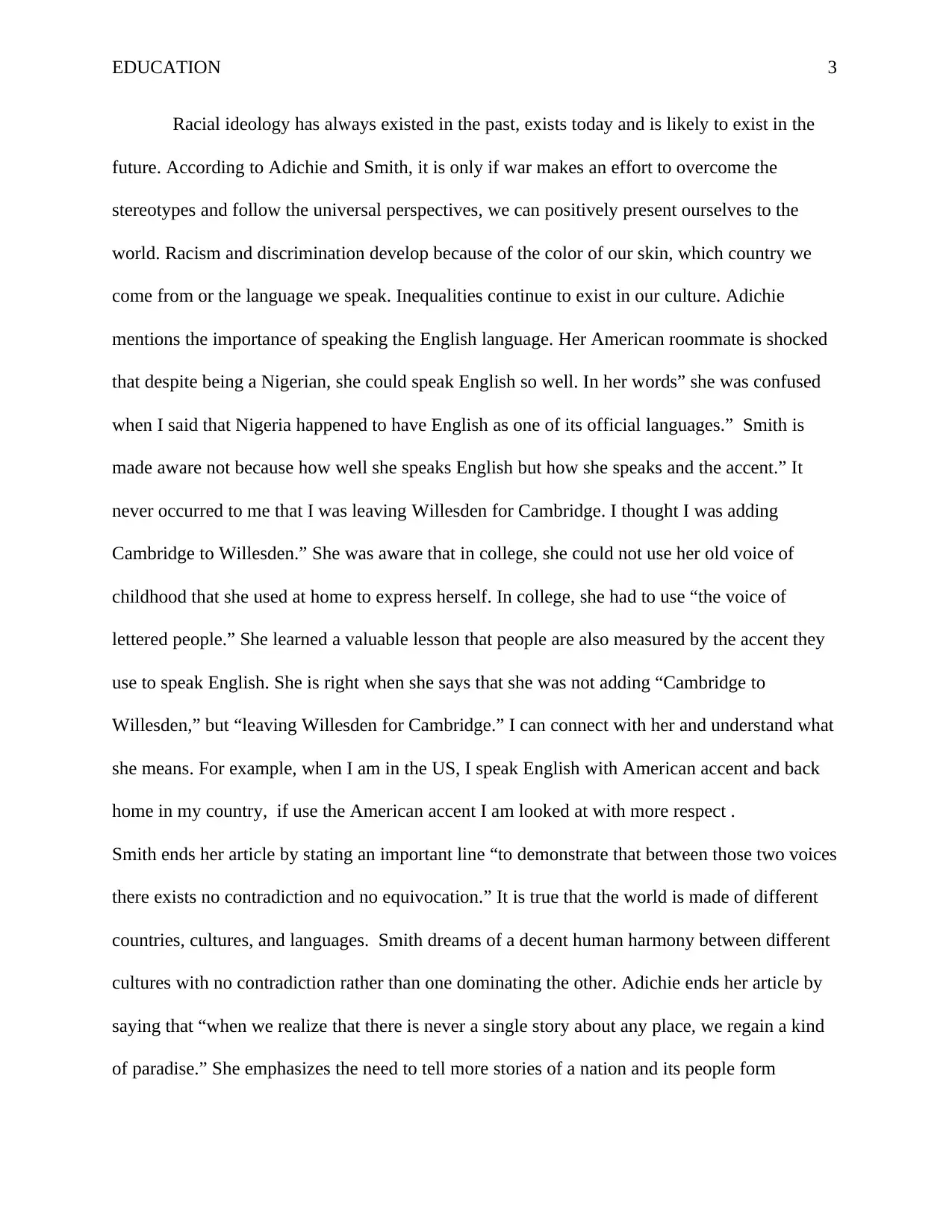
EDUCATION 3
Racial ideology has always existed in the past, exists today and is likely to exist in the
future. According to Adichie and Smith, it is only if war makes an effort to overcome the
stereotypes and follow the universal perspectives, we can positively present ourselves to the
world. Racism and discrimination develop because of the color of our skin, which country we
come from or the language we speak. Inequalities continue to exist in our culture. Adichie
mentions the importance of speaking the English language. Her American roommate is shocked
that despite being a Nigerian, she could speak English so well. In her words” she was confused
when I said that Nigeria happened to have English as one of its official languages.” Smith is
made aware not because how well she speaks English but how she speaks and the accent.” It
never occurred to me that I was leaving Willesden for Cambridge. I thought I was adding
Cambridge to Willesden.” She was aware that in college, she could not use her old voice of
childhood that she used at home to express herself. In college, she had to use “the voice of
lettered people.” She learned a valuable lesson that people are also measured by the accent they
use to speak English. She is right when she says that she was not adding “Cambridge to
Willesden,” but “leaving Willesden for Cambridge.” I can connect with her and understand what
she means. For example, when I am in the US, I speak English with American accent and back
home in my country, if use the American accent I am looked at with more respect .
Smith ends her article by stating an important line “to demonstrate that between those two voices
there exists no contradiction and no equivocation.” It is true that the world is made of different
countries, cultures, and languages. Smith dreams of a decent human harmony between different
cultures with no contradiction rather than one dominating the other. Adichie ends her article by
saying that “when we realize that there is never a single story about any place, we regain a kind
of paradise.” She emphasizes the need to tell more stories of a nation and its people form
Racial ideology has always existed in the past, exists today and is likely to exist in the
future. According to Adichie and Smith, it is only if war makes an effort to overcome the
stereotypes and follow the universal perspectives, we can positively present ourselves to the
world. Racism and discrimination develop because of the color of our skin, which country we
come from or the language we speak. Inequalities continue to exist in our culture. Adichie
mentions the importance of speaking the English language. Her American roommate is shocked
that despite being a Nigerian, she could speak English so well. In her words” she was confused
when I said that Nigeria happened to have English as one of its official languages.” Smith is
made aware not because how well she speaks English but how she speaks and the accent.” It
never occurred to me that I was leaving Willesden for Cambridge. I thought I was adding
Cambridge to Willesden.” She was aware that in college, she could not use her old voice of
childhood that she used at home to express herself. In college, she had to use “the voice of
lettered people.” She learned a valuable lesson that people are also measured by the accent they
use to speak English. She is right when she says that she was not adding “Cambridge to
Willesden,” but “leaving Willesden for Cambridge.” I can connect with her and understand what
she means. For example, when I am in the US, I speak English with American accent and back
home in my country, if use the American accent I am looked at with more respect .
Smith ends her article by stating an important line “to demonstrate that between those two voices
there exists no contradiction and no equivocation.” It is true that the world is made of different
countries, cultures, and languages. Smith dreams of a decent human harmony between different
cultures with no contradiction rather than one dominating the other. Adichie ends her article by
saying that “when we realize that there is never a single story about any place, we regain a kind
of paradise.” She emphasizes the need to tell more stories of a nation and its people form
⊘ This is a preview!⊘
Do you want full access?
Subscribe today to unlock all pages.

Trusted by 1+ million students worldwide
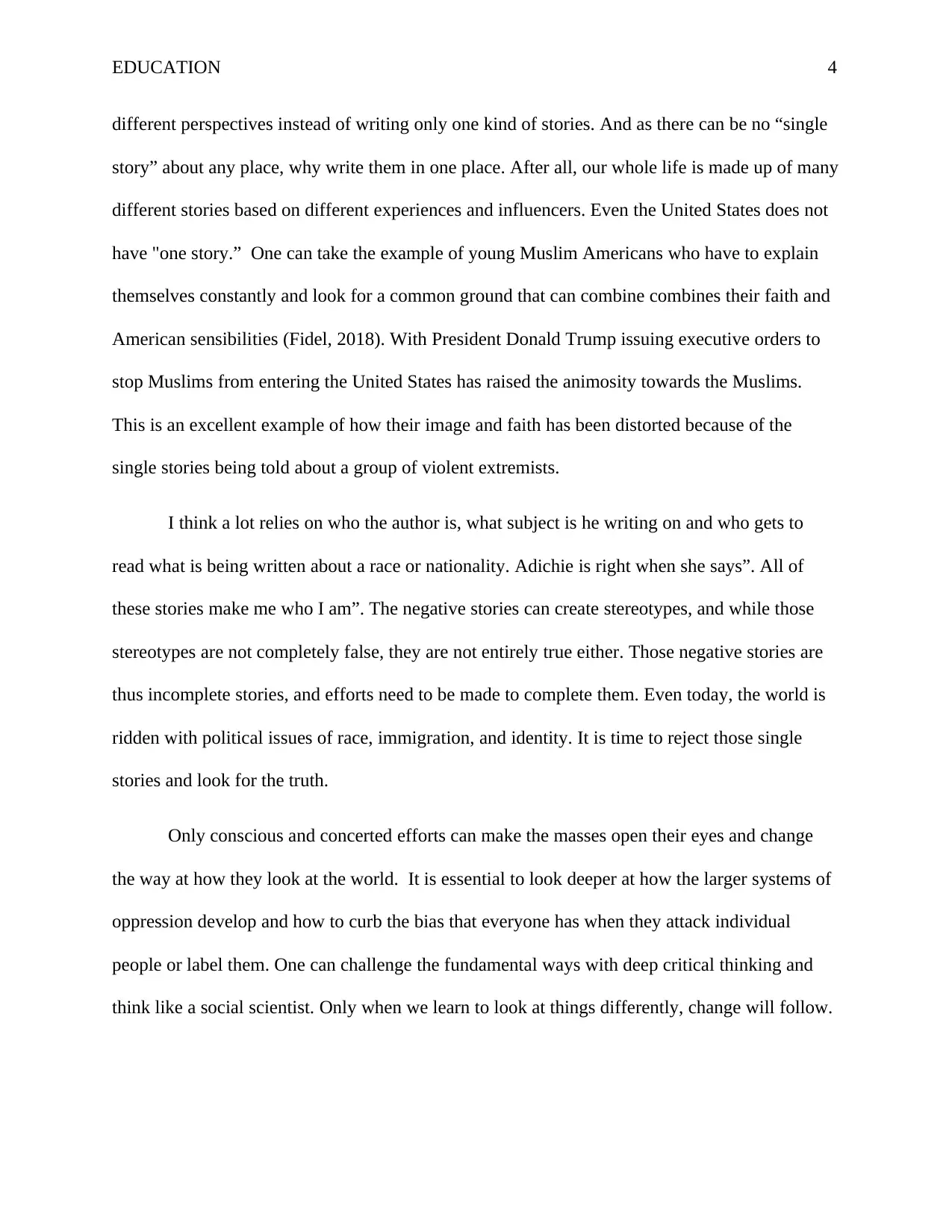
EDUCATION 4
different perspectives instead of writing only one kind of stories. And as there can be no “single
story” about any place, why write them in one place. After all, our whole life is made up of many
different stories based on different experiences and influencers. Even the United States does not
have "one story.” One can take the example of young Muslim Americans who have to explain
themselves constantly and look for a common ground that can combine combines their faith and
American sensibilities (Fidel, 2018). With President Donald Trump issuing executive orders to
stop Muslims from entering the United States has raised the animosity towards the Muslims.
This is an excellent example of how their image and faith has been distorted because of the
single stories being told about a group of violent extremists.
I think a lot relies on who the author is, what subject is he writing on and who gets to
read what is being written about a race or nationality. Adichie is right when she says”. All of
these stories make me who I am”. The negative stories can create stereotypes, and while those
stereotypes are not completely false, they are not entirely true either. Those negative stories are
thus incomplete stories, and efforts need to be made to complete them. Even today, the world is
ridden with political issues of race, immigration, and identity. It is time to reject those single
stories and look for the truth.
Only conscious and concerted efforts can make the masses open their eyes and change
the way at how they look at the world. It is essential to look deeper at how the larger systems of
oppression develop and how to curb the bias that everyone has when they attack individual
people or label them. One can challenge the fundamental ways with deep critical thinking and
think like a social scientist. Only when we learn to look at things differently, change will follow.
different perspectives instead of writing only one kind of stories. And as there can be no “single
story” about any place, why write them in one place. After all, our whole life is made up of many
different stories based on different experiences and influencers. Even the United States does not
have "one story.” One can take the example of young Muslim Americans who have to explain
themselves constantly and look for a common ground that can combine combines their faith and
American sensibilities (Fidel, 2018). With President Donald Trump issuing executive orders to
stop Muslims from entering the United States has raised the animosity towards the Muslims.
This is an excellent example of how their image and faith has been distorted because of the
single stories being told about a group of violent extremists.
I think a lot relies on who the author is, what subject is he writing on and who gets to
read what is being written about a race or nationality. Adichie is right when she says”. All of
these stories make me who I am”. The negative stories can create stereotypes, and while those
stereotypes are not completely false, they are not entirely true either. Those negative stories are
thus incomplete stories, and efforts need to be made to complete them. Even today, the world is
ridden with political issues of race, immigration, and identity. It is time to reject those single
stories and look for the truth.
Only conscious and concerted efforts can make the masses open their eyes and change
the way at how they look at the world. It is essential to look deeper at how the larger systems of
oppression develop and how to curb the bias that everyone has when they attack individual
people or label them. One can challenge the fundamental ways with deep critical thinking and
think like a social scientist. Only when we learn to look at things differently, change will follow.
Paraphrase This Document
Need a fresh take? Get an instant paraphrase of this document with our AI Paraphraser
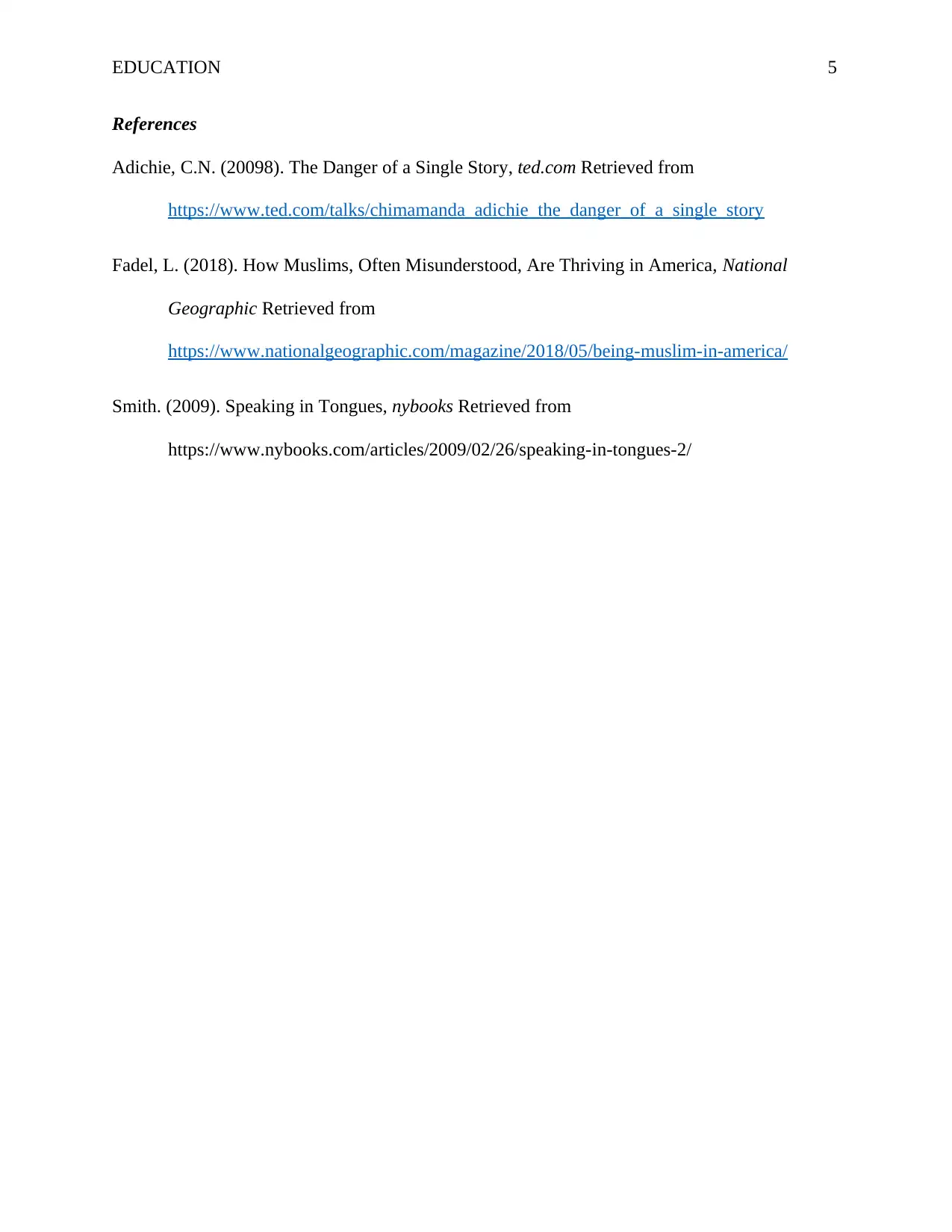
EDUCATION 5
References
Adichie, C.N. (20098). The Danger of a Single Story, ted.com Retrieved from
https://www.ted.com/talks/chimamanda_adichie_the_danger_of_a_single_story
Fadel, L. (2018). How Muslims, Often Misunderstood, Are Thriving in America, National
Geographic Retrieved from
https://www.nationalgeographic.com/magazine/2018/05/being-muslim-in-america/
Smith. (2009). Speaking in Tongues, nybooks Retrieved from
https://www.nybooks.com/articles/2009/02/26/speaking-in-tongues-2/
References
Adichie, C.N. (20098). The Danger of a Single Story, ted.com Retrieved from
https://www.ted.com/talks/chimamanda_adichie_the_danger_of_a_single_story
Fadel, L. (2018). How Muslims, Often Misunderstood, Are Thriving in America, National
Geographic Retrieved from
https://www.nationalgeographic.com/magazine/2018/05/being-muslim-in-america/
Smith. (2009). Speaking in Tongues, nybooks Retrieved from
https://www.nybooks.com/articles/2009/02/26/speaking-in-tongues-2/
1 out of 5
Related Documents
Your All-in-One AI-Powered Toolkit for Academic Success.
+13062052269
info@desklib.com
Available 24*7 on WhatsApp / Email
![[object Object]](/_next/static/media/star-bottom.7253800d.svg)
Unlock your academic potential
Copyright © 2020–2026 A2Z Services. All Rights Reserved. Developed and managed by ZUCOL.




